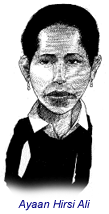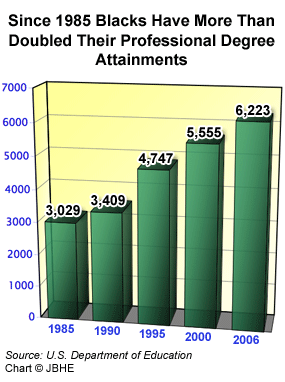Study Finds That Blacks Are Shown in Colleges’ Promotional Photographs Far More Often Than the Actual Percentage of Black Students on Campus
Almost all colleges and universities are now taking steps to recruit black and other minority students. Some go to great lengths to make their campuses appear welcoming. In 2000 the University of Wisconsin airbrushed a photograph of a black student into a brochure showing a group of students at a university football game. The original photograph pictured only white students.
 This highly publicized embarrassment to the University of Wisconsin gave Timothy D. Pippert, a sociologist at Augsburg College in Minneapolis, an idea for an interesting research project. He and his research team examined promotional photographs from 371 predominantly white colleges and universities across the nation and attempted, when possible, to assign a race to each student pictured. Black students made up 7.9 percent of the students at all the colleges in their study. But blacks were at least 12.4 percent of the students pictured in promotional materials. This highly publicized embarrassment to the University of Wisconsin gave Timothy D. Pippert, a sociologist at Augsburg College in Minneapolis, an idea for an interesting research project. He and his research team examined promotional photographs from 371 predominantly white colleges and universities across the nation and attempted, when possible, to assign a race to each student pictured. Black students made up 7.9 percent of the students at all the colleges in their study. But blacks were at least 12.4 percent of the students pictured in promotional materials.
Pippert believes the colleges are not trying to distort the racial makeup of their student bodies to prospective students. Actual racial diversity numbers are readily available from the Department of Education. Rather, Pippert believes the colleges are showing a disproportionate number of black students in order to convey to prospective students that they are welcome on campus.
Pippert told JBHE that at this time they were not prepared to publish data on individual colleges and universities. However, he notes that there were some institutions where the percentage of black students in promotional brochures far exceeded the percentage of blacks in the student body. He also told JBHE that there were some colleges and universities that showed significantly fewer blacks and other minority students than their actual percentages in the student body.
Professor Pippert and his coauthor Edward J. Matchett are planning an analysis to determine if there are any differences in their findings between private and public institutions of higher learning.
Three Black Scholars Among This Year’s Class of Fletcher Fellows
In 2004 Alphonse “Buddy” Fletcher Jr., a Wall Street money manager, announced a $50 million endowment to fund institutions and individuals who are working to further racial equality. The Fletcher Fellowships offer $50,000 grants to people of any race whose work seeks to improve race relations in this country. The Fletcher Scholarship program is administered by the W.E.B. Du Bois Institute for African and African-American Research at Harvard University. Henry Louis Gates Jr., director of the institute, is the chair of the Fletcher Fellows selection committee.
In the first three years of the program, 28 Fletcher Fellows were named. This year there are four new Fletcher Fellows. Three of the four are African-American scholars:
 • Clayborne Carson is professor of history and founding director of the Martin Luther King Jr. Research and Education Institute at Stanford University. In 1985 he began a major project to edit and publish the papers of Martin Luther King Jr. • Clayborne Carson is professor of history and founding director of the Martin Luther King Jr. Research and Education Institute at Stanford University. In 1985 he began a major project to edit and publish the papers of Martin Luther King Jr.
Professor Carson will use his Fletcher Fellowship to produce online educational content for the study of the humanities.
• Kellie Jones, an associate professor of art history and archaeology at Columbia University, will produce an oral history project on modern literary and visual culture of the African-American community.
 • Kimberlé Crenshaw, a professor of law at UCLA and Columbia University, will conduct work on a project entitled, “Shattering the Colorblind Ruse: Recapturing the Legacy of Brown.” Her thesis is that today’s notion of colorblindness undermines the nation’s ability to address ongoing patterns of racial inequality. • Kimberlé Crenshaw, a professor of law at UCLA and Columbia University, will conduct work on a project entitled, “Shattering the Colorblind Ruse: Recapturing the Legacy of Brown.” Her thesis is that today’s notion of colorblindness undermines the nation’s ability to address ongoing patterns of racial inequality.
Muslims Stack the Deck in Online Poll of World’s Top Public Intellectuals
 Last month JBHE reported that three black scholars, including Princeton University’s K. Anthony Appiah, were nominated by the journal Foreign Policy as among the world’s most influential public intellectuals. A total of 100 individuals were nominated by the journal, and voting to select the top 20 was held on the Internet. Last month JBHE reported that three black scholars, including Princeton University’s K. Anthony Appiah, were nominated by the journal Foreign Policy as among the world’s most influential public intellectuals. A total of 100 individuals were nominated by the journal, and voting to select the top 20 was held on the Internet.
News of the Internet poll appeared on the front pages of several newspapers in the Middle East. Almost immediately votes poured in to the Foreign Policy web site for the Muslim intellectuals who were included in the list of 100 nominees. As a result, the top 10 vote-getters in the Foreign Policy poll are all Muslims. Voted the world’s top public intellectual was Fethullah Gülen, an Islamic scholar from Turkey. Most Americans have probably never heard his name.
The only black public intellectual who made the final list was Ayaan Hirsi Ali, a native of Somalia and former member of the Dutch parliament. Ali was raised as a Muslim but is now a fervent critic of radical Islam.
Fisk University Makes Progress in Fundraising
 Fisk University president Hazel O’Leary announced that the historically black educational institution in Nashville, Tennessee, had raised $8.3 million in the past year, more than doubling the donations from the prior 12 months. Fisk’s fundraising success qualifies it to receive an additional $2 million in matching funds from the Andrew W. Mellon Foundation. Fisk University president Hazel O’Leary announced that the historically black educational institution in Nashville, Tennessee, had raised $8.3 million in the past year, more than doubling the donations from the prior 12 months. Fisk’s fundraising success qualifies it to receive an additional $2 million in matching funds from the Andrew W. Mellon Foundation.
At Fisk’s recent alumni reunion week, $800,000 was raised. This quadrupled the amount raised at a similar event last year.
For the past three years, Fisk has been trying to raise funds by selling one or two paintings from its art collection. But the courts have blocked the sale due to stipulations from the paintings’ donor that Fisk not break up the original collection.
North Carolina Central University Seeks to Boost Retention and Graduation Rates
 North Carolina Central University, the historically black educational institution in Durham, has mounted a new effort to boost the retention rate of freshman students with the hope that this will lead to a corresponding increase in the university’s graduation rate. North Carolina Central University, the historically black educational institution in Durham, has mounted a new effort to boost the retention rate of freshman students with the hope that this will lead to a corresponding increase in the university’s graduation rate.
The most recent figures show that 23 percent of freshman students at the predominantly black university do not return for their sophomore year. Slightly less than half of entering freshmen complete a bachelor’s degree within six years.
The university has budgeted $1.6 million in an effort to boost freshman retention. As part of the effort, the university plans to hire 46 new staff members including tutors, reading assessment specialists, and academic counselors. About 150 volunteers — including current upperclassmen, faculty, members, and alumni — will join the program as mentors to incoming students.
New orientation programs and a community service initiative will seek to encourage students to become involved with the campus community.
NCCU chancellor Charlie Nelms says, “You can’t talk student persistence and graduation into existence. You have to plan it, and you have to invest in it.”
  |
26.2% Percentage of all white high school seniors in 2004 elected to an academic honor society.
13.1% Percentage of all African-American high school seniors in 2004 elected to an academic honor society.
source: U.S. Department of Education
|
In Memoriam
Frederick Douglass Jefferson Jr. (1928-2008)
Frederick Douglass Jefferson Jr., theologian and seminary professor, has died from complications associated with Parkinson’s disease at a nursing home in Rochester, New York. He was 79 years old.
A native of Ardmore, Pennsylvania, the Reverend Jefferson graduated in 1950 from Wilberforce University in Ohio. After serving in the Korean War, Jefferson earned a master’s degree from Yale Divinity School and a doctorate in divinity from the University of Chicago.
In 1969 he was one of three black professors hired at the Colgate Rochester Crozer Divinity School. In addition to teaching he served as pastor of Trinity Emmanuel Presbyterian Church in Rochester.
Honors and Awards
 • Rosa E. Blackwell, who will retire next week as superintendent of the public school system in Cincinnati, Ohio, will have two college scholarship programs named in her honor. One half of the school district’s Rosa E. Blackwell scholarships will go to Cincinnati high school students of any race who have been accepted for admission at a historically black college or university. Students accepted at any four-year college or university will be eligible for the other half of available scholarships in the Rosa E. Blackwell program. • Rosa E. Blackwell, who will retire next week as superintendent of the public school system in Cincinnati, Ohio, will have two college scholarship programs named in her honor. One half of the school district’s Rosa E. Blackwell scholarships will go to Cincinnati high school students of any race who have been accepted for admission at a historically black college or university. Students accepted at any four-year college or university will be eligible for the other half of available scholarships in the Rosa E. Blackwell program.
The Cincinnati chapter of Project GRAD, a nonprofit organization seeking to better the educational opportunities of disadvantaged students, also created a scholarship in honor of Blackwell. This scholarship will go to Cincinnati high school students who plan to major in education once they enroll in college.
Grants
 • Stephen Mayo, vice provost and Bren Professor of Biology and Chemistry at the California Institute of Technology, was awarded a National Security Science and Engineering Fellowship from the U.S. Department of Defense. Over the next five years, up to $3 million will be made available for Mayo’s research on developing and testing computer algorithms for designing proteins. The practical applications for this research are the development of proteins for preventing and treating viral diseases. • Stephen Mayo, vice provost and Bren Professor of Biology and Chemistry at the California Institute of Technology, was awarded a National Security Science and Engineering Fellowship from the U.S. Department of Defense. Over the next five years, up to $3 million will be made available for Mayo’s research on developing and testing computer algorithms for designing proteins. The practical applications for this research are the development of proteins for preventing and treating viral diseases.
• Miles College, the historically black educational institution in Fairfield, Alabama, received a $650,000 grant from the Wachovia Foundation. The funds will be used for scholarships for honors students, to make infrastructure improvements at the college’s north campus, and to establish the Miles College Community Development Center. The Community Development Center will coordinate projects in the neighborhood surrounding the Miles College campus to produce jobs, improve housing, and to help build strong families.
• Florida A&M University, the historically black educational institution in Tallahassee, received a $14 million grant from the National Institutes of Health. The grant will be used to fund research in degenerative diseases at the College of Pharmacy and Pharmaceutical Sciences.
• Howard University, the historically black educational institution in Washington, D.C., received a $300,000 grant from CVS/pharmacy for renovations to its Pharmacy Practice Laboratory. The laboratory houses 24 workstations where students can learn the pharmacy trade.
|
More Black High School Students Are Taking the Advanced Courses in Science Required for Admission to Our Top Colleges and Universities
 Advanced science courses such as Chemistry II or Physics II are essential if black high school students want to compete for places at high-ranking colleges and universities. According to a new report from the Department of Education, black students are making good progress in this area. Advanced science courses such as Chemistry II or Physics II are essential if black high school students want to compete for places at high-ranking colleges and universities. According to a new report from the Department of Education, black students are making good progress in this area.
In 1982, 7.8 percent of black high school seniors were enrolled in an advanced science course. By 1992 the percentage had edged up to 10.7 percent. But over the next decade the percentage of black high school students in advanced science nearly doubled. In 2004, 21.3 percent of all African-American high school seniors were taking an advanced science course.
  |
“I know that nine children did not walk through a schoolhouse door in Little Rock so we could stand by and let our children drop out of school and turn to gangs for the support they didn’t get elsewhere.”
— Barack Obama, addressing the NAACP annual convention in Cincinnati, July 14, 2008
|
A Unique Honor at Johns Hopkins University for Benjamin Carson
 Benjamin S. Carson, one of the nation’s foremost pediatric neurosurgeons, was appointed to an endowed professorship at Johns Hopkins University, a professorship which bears his name. Carson, who has served on the faculty at Johns Hopkins since 1984, is the first scholar to fill the Benjamin S. Carson and Dr. Evelyn Spiro Professorship in Pediatric Neurosurgery. Benjamin S. Carson, one of the nation’s foremost pediatric neurosurgeons, was appointed to an endowed professorship at Johns Hopkins University, a professorship which bears his name. Carson, who has served on the faculty at Johns Hopkins since 1984, is the first scholar to fill the Benjamin S. Carson and Dr. Evelyn Spiro Professorship in Pediatric Neurosurgery.
Evelyn Spiro, a nurse, and her philanthropist husband, Donald, were among the donors providing money for the endowed chair. Also contributing to the fund was Ernest Bates, who in 1958 was the first African American to graduate from Johns Hopkins University’s School of Arts and Sciences. Bates went on to medical school at the University of Rochester and was among the first three African Americans to be board-certified in neurosurgery.
Why the Large Decline in Black Enrollments at the Chapel Hill Law School?
 According to a recent study by JBHE, 18 of the nation’s 30 leading law schools saw a decline in black enrollments in the 1998 to 2007 period. One of the largest declines has been at the law school at the University of North Carolina at Chapel Hill. Data from the American Bar Association shows that in 1999 there were 91 black students at the law school at the University of North Carolina at Chapel Hill. In 2007 there were 51 black students enrolled. This is a decline of more than 40 percent. According to a recent study by JBHE, 18 of the nation’s 30 leading law schools saw a decline in black enrollments in the 1998 to 2007 period. One of the largest declines has been at the law school at the University of North Carolina at Chapel Hill. Data from the American Bar Association shows that in 1999 there were 91 black students at the law school at the University of North Carolina at Chapel Hill. In 2007 there were 51 black students enrolled. This is a decline of more than 40 percent.
 Charles E. Daye, Henry Brandis Professor of Law and deputy director of the Center for Civil Rights at the law school, tells JBHE, “Clearly, we have lost some ground. Other schools have ‘raided’ our admitted students with higher offers of scholarships and financial aid than has been the case in the past. We have made offers, gotten a fair yield and deposits paid, and then suffered attrition in our enrollment rate.” Charles E. Daye, Henry Brandis Professor of Law and deputy director of the Center for Civil Rights at the law school, tells JBHE, “Clearly, we have lost some ground. Other schools have ‘raided’ our admitted students with higher offers of scholarships and financial aid than has been the case in the past. We have made offers, gotten a fair yield and deposits paid, and then suffered attrition in our enrollment rate.”
Professor Daye reports that the law school is taking steps to reverse the decline. “I know of no one here who is proud of the decline. And we are working to reverse it. We are working to improve the attractiveness of our financial aid package.”

FIELDING GRADUATE UNIVERSITY

President
Fielding Graduate University seeks a president to lead it to the next exciting level of excellence and innovation. Reporting to a deeply engaged board of trustees and serving as the chief executive officer of the university, the new president will inherit an institution with a distinguished and dedicated faculty, extraordinarily devoted students, a sound balance sheet, and no athletic program. From the university’s headquarters in Santa Barbara, California, the president will lead a high tech, yet “high touch” institution that has the potential to serve additional cadres of students while maintaining its high standards for scholarship and learning. Doing so will require a true leader whose personal attributes comport with the words most frequently used to describe the people of Fielding: smart, caring, creative, and independent. Fielding’s next president will have both scholarly credentials (as evidenced by an earned terminal degree), resonance with Fielding’s intellectual culture, and exceptional business acumen characterized by an entrepreneurial spirit.
The new president will lead an institution with outstanding intellectual bona fides and sound business fundamentals to a new level of attainment and public awareness. In accomplishing this task, the president will be guided by Fielding’s central mission: to serve a community of scholar-practitioners dedicated to transformational learning, diversity, and social justice.
Recruitment will continue until the position is filled. Nominations, expressions of interest, and applications (including a cover letter and resume) should be submitted electronically to the consultants supporting Fielding Graduate University in this search, Dennis M. Barden, Robin G. Mamlet, and Elizabeth K. Bohan, at FieldingPres@wittkieffer.com.
Material that cannot be sent electronically may be mailed to:
President
Fielding Graduate University
c/o Witt/Kieffer
Attention: Dennis M. Barden/Robin G. Mamlet
2015 Spring Road, Suite 510
Oak Brook, IL 60523
This search will be conducted with the utmost respect for candidate confidentiality. Inquiries and questions concerning this search may be directed to Dennis M. Barden at 630-575-6167, Robin G. Mamlet at 610-544-3474, or Elizabeth K. Bohan at 630-575-6161.
Fielding Graduate University is an equal opportunity, affirmative action, and non-discriminatory employer and is committed to a diverse faculty, staff, and student body.

38 African-American Students Selected in the Latest Class of Merck Science Fellows
 In a program administered by the United Negro College Fund, 38 black students have been named Merck Science Fellows for 2008. There are three different categories in the program all geared toward students in the fields of biomedical science. Fellowship awards are available for black students entering any four-year college or university in the United States and for students in graduate programs in the biomedical sciences; there are also postdoctoral fellowships. Scholarships range from $25,000 to $85,000 each. In a program administered by the United Negro College Fund, 38 black students have been named Merck Science Fellows for 2008. There are three different categories in the program all geared toward students in the fields of biomedical science. Fellowship awards are available for black students entering any four-year college or university in the United States and for students in graduate programs in the biomedical sciences; there are also postdoctoral fellowships. Scholarships range from $25,000 to $85,000 each.
Since the Merck Fellows program was established in 1995, 479 black students in the biomedical sciences have received scholarship grants under the program.
The Halt in Black Progress in Professional Degree Attainments
In the 2005-06 academic year, blacks earned 6,223 professional degrees. They made up 7.1 percent of all professional degrees awarded in the United States that year. Included are degrees in medicine, law, dentistry, and several other fields.
Since 1985 the number of blacks earning professional degrees each year has more than doubled. But the number of blacks earning professional degrees actually declined slightly in 2006. The percentage of all professional degrees earned by blacks also showed a slight decrease. Law and medical degree awards, the two disciplines with the most professional degrees, have seen a drop-off in blacks in recent years. Blacks have seen significant professional degree gains in pharmacy, podiatry, and divinity.
Blacks made up nearly 15 percent of all students who earned a professional degree at divinity schools. However, blacks continue to have a very small presence in professional degree awards in dentistry, osteopathic medicine, optometry, chiropractic medicine, and veterinary medicine.

Appointments
 • Diana Paulin was appointed assistant professor of English and American studies at Trinity College in Hartford, Connecticut. She was an assistant professor at Yale University. • Diana Paulin was appointed assistant professor of English and American studies at Trinity College in Hartford, Connecticut. She was an assistant professor at Yale University.
Dr. Paulin is a graduate of Georgetown University. She holds a master’s degree from the University of Washington and a Ph.D. from Stanford University.
 • Harry Le Grande was named vice chancellor for student affairs at the University of California at Berkeley. He has served in the post on an interim basis since January 2007. Previously, he was associate vice chancellor for student affairs with responsibilities for residential and student services programs. • Harry Le Grande was named vice chancellor for student affairs at the University of California at Berkeley. He has served in the post on an interim basis since January 2007. Previously, he was associate vice chancellor for student affairs with responsibilities for residential and student services programs.
Le Grande is a graduate of the University of California at Irvine. He holds a master’s degree from Oregon State University.
 • Patty Ball Thomas, assistant professor of reading in the College of Education at Florida A&M University, was appointed by Florida governor Charlie Crist to the Florida Commission on Human Relations. The commission is charged with enforcing the Florida Civil Rights Act and the Florida Fair Housing Act. • Patty Ball Thomas, assistant professor of reading in the College of Education at Florida A&M University, was appointed by Florida governor Charlie Crist to the Florida Commission on Human Relations. The commission is charged with enforcing the Florida Civil Rights Act and the Florida Fair Housing Act.
 • Beverly Guy-Sheftall, Anna Julia Cooper Professor of Women’s Studies and founding director of the Women’s Research and Resource Center at Spelman College, was elected president of the National Women’s Studies Association. • Beverly Guy-Sheftall, Anna Julia Cooper Professor of Women’s Studies and founding director of the Women’s Research and Resource Center at Spelman College, was elected president of the National Women’s Studies Association.
 • Fidelis M. Ikem was appointed dean and chief research officer of the School of Graduate Studies at Winston-Salem State University in North Carolina. He was associate dean of the College of Business at Kutztown University of Pennsylvania. • Fidelis M. Ikem was appointed dean and chief research officer of the School of Graduate Studies at Winston-Salem State University in North Carolina. He was associate dean of the College of Business at Kutztown University of Pennsylvania.
Ikem is a graduate of Metropolitan State College in Denver. He holds two master’s degrees, one from Clemson University and the other from Case Western Reserve University in Cleveland. He holds a Ph.D. in operations research from Case Western Reserve.
 • Franklin D. Gilliam Jr. was appointed dean of the School of Public Affairs at the University of California at Los Angeles. Dr. Gilliam has taught political science at UCLA for more than two decades. • Franklin D. Gilliam Jr. was appointed dean of the School of Public Affairs at the University of California at Los Angeles. Dr. Gilliam has taught political science at UCLA for more than two decades.
Professor Gilliam is a graduate of Drake University in Des Moines, Iowa. He holds a master’s degree and a Ph.D. from the University of Iowa.
 • Ceola Ross Baber was named dean of the School of Education at North Carolina A&T State University in Greensboro. She was previously the associate dean of the School of Education at the University of North Carolina at Greensboro. • Ceola Ross Baber was named dean of the School of Education at North Carolina A&T State University in Greensboro. She was previously the associate dean of the School of Education at the University of North Carolina at Greensboro.
She holds a master’s degree from Stanford University and a doctorate from Purdue University.
|
 .
.